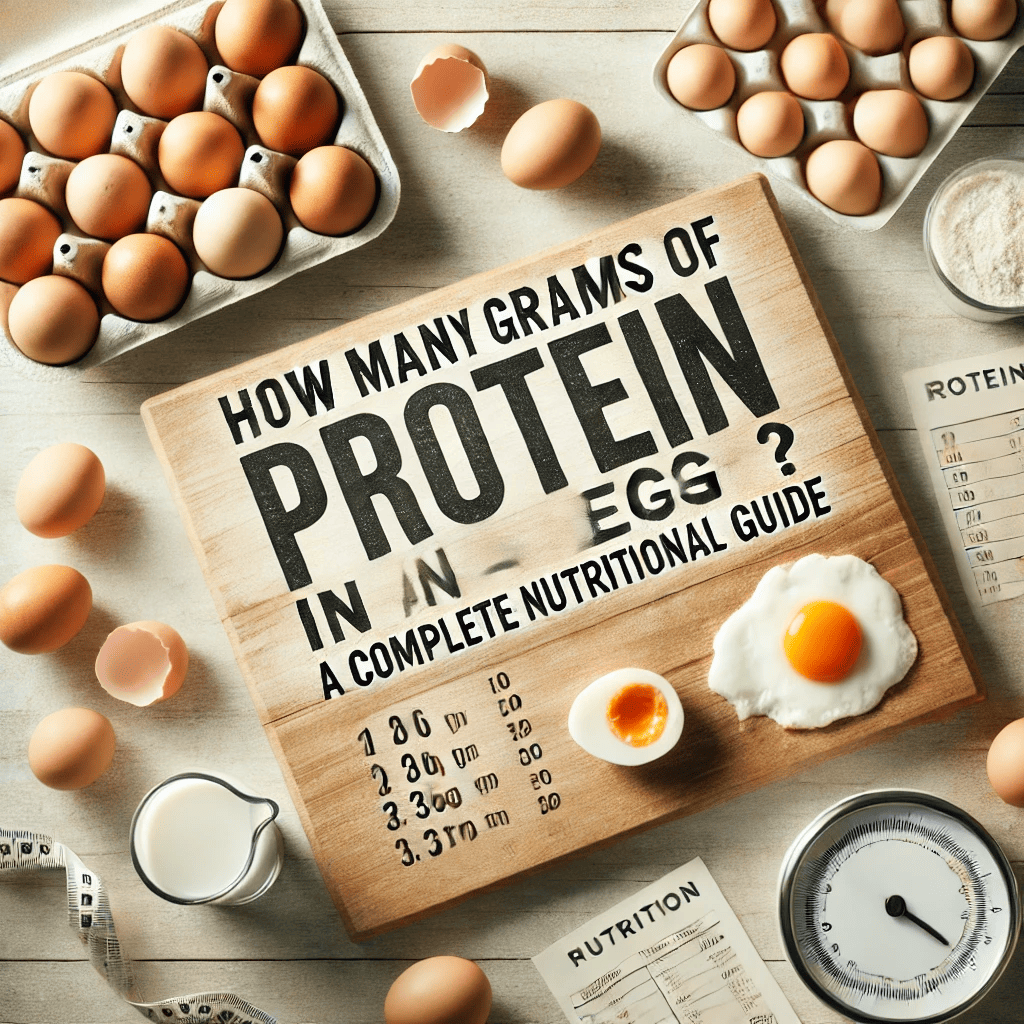How Many Grams of Protein in an Egg?
Eggs are a staple food for health-conscious individuals worldwide. Whether you’re a gym-goer, a busy professional, or simply someone who enjoys a nutritious breakfast, eggs are a go-to source of high-quality protein. But how much protein does an egg actually contain? Let’s break it down in detail.
Nutritional Profile of an Egg
Eggs are packed with nutrients beyond protein, making them one of the most complete natural foods. Here’s a quick overview of their composition:
| Component | Quantity (Per Large Egg) | Key Benefits |
|---|---|---|
| Protein | ~6 grams | Muscle repair and growth |
| Calories | ~70 | Provides energy |
| Fats | ~5 grams | Essential for hormone function |
| Vitamins | B12, D, A, E, K | Supports immunity and health |
Note: The protein content may vary slightly depending on the egg’s size.
Protein Content by Egg Size
| Egg Size | Protein (grams) | Calories |
|---|---|---|
| Small | ~4.9 | ~55 |
| Medium | ~5.7 | ~65 |
| Large | ~6.3 | ~70 |
| Extra-Large | ~7.0 | ~80 |
| Jumbo | ~7.9 | ~90 |
Whole Egg vs. Egg White: Which Has More Protein?
While the yolk is nutrient-dense, the majority of an egg’s protein is found in the white. Here’s how they compare:
| Part | Protein (grams) | Calories | Additional Nutrients |
|---|---|---|---|
| Egg White | ~3.6 | ~17 | Rich in potassium, magnesium |
| Egg Yolk | ~2.7 | ~55 | Contains vitamins and healthy fats |
Example: If you consume two large egg whites, you get approximately 7.2 grams of protein, almost equivalent to one large egg’s protein content but with fewer calories.
Protein in Cooked Eggs vs. Raw Eggs
Cooking eggs doesn’t significantly alter their protein content but improves digestibility.
| Preparation Method | Protein Retention | Calories |
|---|---|---|
| Boiled | ~6 grams | ~70 |
| Scrambled | ~6 grams | ~90 |
| Poached | ~6 grams | ~70 |
Tip: Always cook eggs to eliminate bacteria like Salmonella.
Real-Life Example: Protein Needs Met by Eggs
- Scenario 1: A gym enthusiast needs 60 grams of protein daily. Eating 10 large eggs can meet this requirement entirely.
- Scenario 2: A sedentary person requires ~50 grams daily. Five large eggs can cover more than half their needs.
Why Eggs Are a Superior Protein Source
Egg protein has a biological value (BV) of 100, meaning it’s the gold standard for protein absorption and utilization.
- Leucine Content: Eggs contain leucine, a key amino acid for muscle growth.
- Complete Protein: Eggs provide all nine essential amino acids, making them ideal for muscle repair and overall health.
Eggs and Special Diets
| Diet Type | Can They Include Eggs? | Protein Contribution |
|---|---|---|
| Keto | Yes | High protein, low carb |
| Paleo | Yes | Aligns with ancestral eating habits |
| Vegetarian | Yes (not vegan) | Primary protein source for many vegetarians |
Tips to Maximize Protein Intake from Eggs
- Pair with Veggies: Add spinach or kale for extra nutrients.
- Opt for Free-Range Eggs: They may have slightly better nutritional profiles.
- Cook Wisely: Avoid over-frying to retain nutrients.
Unique Insight: The Role of Protein in Eggshell Formation
Did you know an egg’s shell also contains protein? While not edible, the shell protects the nutrient-rich yolk and white, highlighting nature’s efficiency.
Protein Comparison: Eggs vs. Other Foods
| Food Item | Protein (grams per 100g) | Why Choose Eggs? |
|---|---|---|
| Chicken Breast | ~31 | Eggs are more versatile |
| Lentils | ~9 | Easier to prepare |
| Greek Yogurt | ~10 | Cost-effective |
The Science Behind Protein in Eggs
Protein is an essential macronutrient, and eggs are one of the best natural sources. But what makes egg protein unique?
1. High Biological Value (BV)
The biological value of a protein measures how efficiently the body uses it. Eggs have a BV of 100, meaning they are completely absorbed and utilized.
2. Rich in Essential Amino Acids
Eggs provide all nine essential amino acids, including leucine, valine, and isoleucine, crucial for:
- Muscle building
- Tissue repair
- Immune function
3. Ideal for Weight Management
Protein-rich foods like eggs keep you full longer. A study published in The American Journal of Clinical Nutrition found that protein increases satiety and reduces calorie intake.
How Eggs Contribute to Muscle Growth
Egg protein is a favorite among athletes and bodybuilders. Here’s why:
- Leucine Content: Each egg has ~0.6 grams of leucine, the amino acid that stimulates muscle protein synthesis.
- Quick Absorption: Cooked eggs are absorbed faster than raw ones, making them perfect post-workout snacks.
Example: Consuming 3 boiled eggs (18g protein) after a workout can aid muscle repair and growth.
Debunking the Myths About Eggs
Many misconceptions surround eggs, especially regarding protein. Let’s clear them up:
Myth 1: Raw Eggs Have More Protein
Fact: Raw eggs contain the same protein as cooked ones, but cooking improves digestibility.
Myth 2: Eating Too Many Eggs Is Harmful
Fact: For healthy individuals, consuming 1-3 eggs daily is safe and beneficial.
Myth 3: Only Egg Whites Are Healthy
Fact: While egg whites are pure protein, the yolk contains essential nutrients like vitamin D, choline, and omega-3 fatty acids.
Different Ways to Add Protein from Eggs to Your Diet
Eggs are versatile and can be used in various dishes. Here are some protein-packed ideas:
- Breakfast:
- Make a spinach and egg white omelet (~15g protein).
- Pair boiled eggs with avocado toast (~12g protein).
- Lunch:
- Add hard-boiled eggs to a chicken salad (~20g protein total).
- Snacks:
- Deviled eggs (~6g protein per serving).
- Dinner:
- Include scrambled eggs in a stir-fry with vegetables (~18g protein).
Eggs and Protein Intake for Different Lifestyles
| Lifestyle | Recommended Egg Intake | Why It Works |
|---|---|---|
| Sedentary | 1-2 eggs daily | Maintains muscle mass |
| Active | 2-4 eggs daily | Supports recovery and energy needs |
| Athlete/Bodybuilder | 4-6 eggs daily (or more) | Meets high protein demands |
Practical Tips for Buying and Storing Eggs
- Choose Quality: Look for pasture-raised or organic eggs for better nutrition.
- Check Freshness: Place an egg in water; if it sinks, it’s fresh. If it floats, it’s old.
- Store Properly: Refrigerate eggs to preserve protein and nutrients.
Protein-Rich Recipes Using Eggs
Recipe 1: Protein-Packed Egg Salad
Ingredients:
- 3 hard-boiled eggs
- 2 tablespoons Greek yogurt
- Chopped parsley
Steps:
- Chop eggs and mix with yogurt and parsley.
- Enjoy as a sandwich or on whole-grain crackers.
Protein Content: ~21 grams
Recipe 2: Egg and Quinoa Bowl
Ingredients:
- 2 poached eggs
- 1 cup cooked quinoa
- Sautéed vegetables
Steps:
- Combine all ingredients in a bowl.
- Top with a pinch of salt and pepper.
Protein Content: ~25 grams
Egg Protein vs. Plant-Based Protein
Some people wonder if plant-based proteins can replace eggs. While they can be complementary, eggs offer certain advantages:
| Protein Source | Protein (per 100g) | Amino Acid Profile | Absorption |
|---|---|---|---|
| Eggs | ~12g | Complete | High |
| Lentils | ~9g | Incomplete | Moderate |
| Tofu | ~8g | Incomplete | Moderate |
Egg Facts and Trivia
- Egg Variety: There are over 20 billion eggs produced annually in the USA alone.
- World Record: The heaviest egg ever laid weighed over 6 ounces!
- Protein Power: The protein in eggs is as high-quality as whey protein supplements.
Final Thoughts
Eggs are a nutritional powerhouse, offering high-quality protein that suits various lifestyles and fitness goals. By understanding their protein content and versatility, you can maximize their benefits in your daily diet.
Eggs are an affordable, versatile, and nutritious way to meet your daily protein requirements. Whether you enjoy them boiled, scrambled, or in an omelet, incorporating eggs into your diet is a step toward better health.




